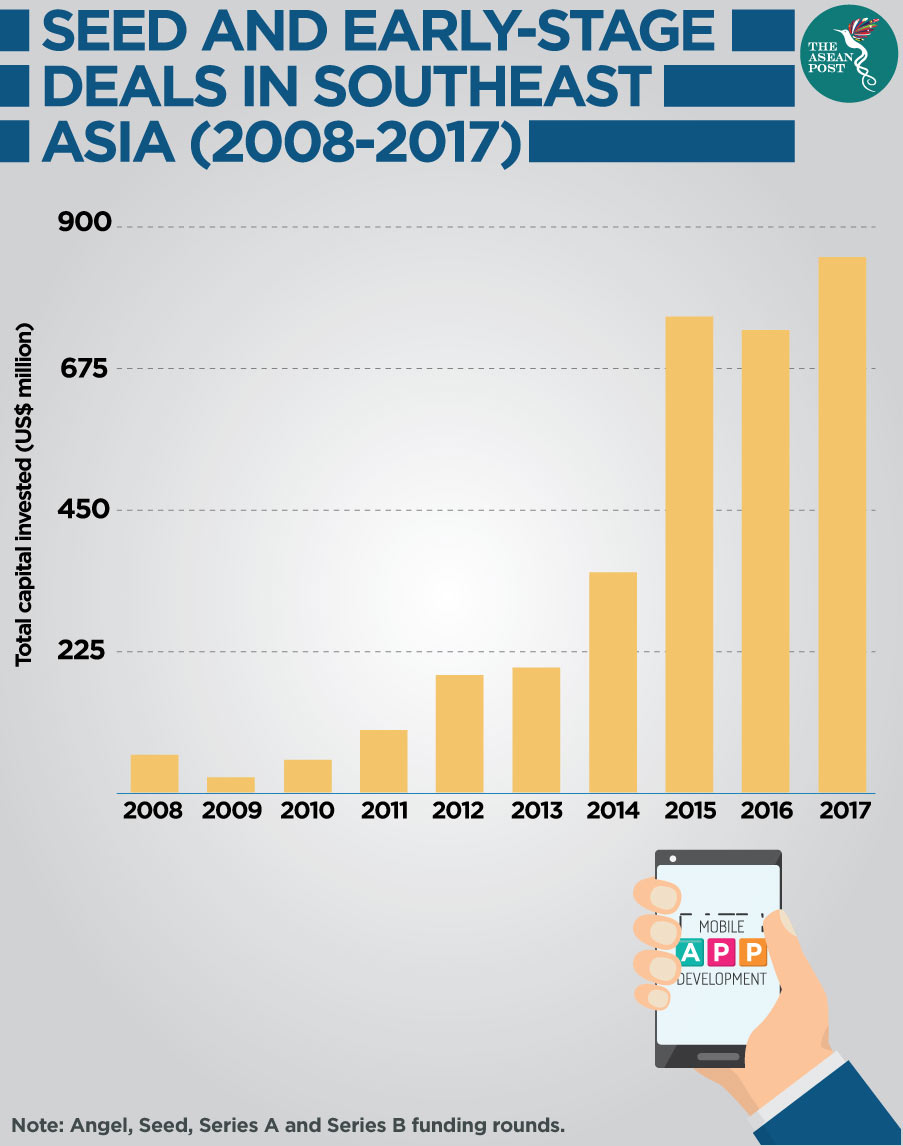The start-up ecosystem in Southeast Asia is improving and nurturing more homegrown start-ups. Based on data from a report by e27, Asia's largest tech media platform, titled ‘Southeast Asia’s start-up ecosystem report 2018’, at least 5,828 active start-ups are operating across six ASEAN countries (Singapore, Malaysia, Indonesia, Thailand, Vietnam and the Philippines). The number reflects the start-ups who have either created a profile or updated their existing ones on e27’s media platform in 2018.
Investors are part of the start-up ecosystem. “Behind every successful large technology start-up, there is an angel,” said Dr Sivapalan Vivekrajah, president of the Malaysian Business Angels Network (MBAN) during his opening keynote at the ASEAN Angel Alliance Summit 2018.
ASEAN’s angel investment is growing in maturity as well as in numbers. According to data from Crunchbase, a networking platform for professionals, seed and early-stage funding in Southeast Asia rose from US$61 million in 2008 to US$853.2 million in 2017, which is a 326 percent increase.
As the ecosystem gets vibrant, investors are now looking for the next exit-able venture and even the next unicorn.
First investors
An angel investor is an individual with a net worth of US$1 million or more, excluding the value of their home, or who has an annual income of US$200,000 with the expectation that this income will continue to grow. Angels typically invest in deals earlier than venture capitalists, funding the last stage of technical development and early market entry.
Dr Melissa Foo, vice-president of MBAN, described angel investment as an “early-stage investment by investors looking for small companies, that they can put some money in and prepare them for the next stage.” She added that angels, who are usually first investors, don’t just provide financial support but also mentorship and business advice.

Angels are not just first investors; they are also teachers who set the right frame for start-ups to grow. The Business Angel Network of Southeast Asia (BANSEA), the oldest angel investment network in the region, has been promoting the development of the ecosystem through educational conferences, workshops, research, networking with angel groups worldwide, contributing to improving the environment and facilitating the matching of early-stage companies with angel investors.
Angels also invest in ideas that are usually very high in risk, but the odds of investing in a successful company are very low. Most angels look for an exit or liquidity event, which is the purchase or sale of a corporation or an initial public offering (IPO) where angels get their money back, usually within three to five years.
What do angel investors look for in a start-up? Peter Wee, MBAN council member and mentor at NEXEA, says that “the ‘secret sauce’ is to be able to identify and select those start-ups that have the potential to succeed by looking at the founders, their problems and solutions, business models and addressable markets.”
Start-ups have to demonstrate to investors the problems they are trying to solve, have significant potential and that people are willing to pay for it. Understanding the entrepreneur’s motivation is also vital. “They must believe in what they want to do. Being an entrepreneur is a long and arduous journey, the path of which is strewn with challenges,” Wee told The ASEAN Post, adding that “business models will invariably change as the start-up progresses but would they [start-up] be able to execute the plan?”
Incentives
Singapore’s thriving start-up ecosystem includes tax incentives, cash grants, numerous financing schemes, relaxed regulatory barriers and increased efforts to protect intellectual property. There is also an Angel Investors Tax Deduction Scheme (AITD) which allows angels to deduct up to 50 percent of their investment at the end of two years if they commit a minimum of US$100,000 in a qualifying start-up.
In Malaysia, government-assisted programs have helped develop the start-up landscape. One of these programs is the Cradle Fund, which is Malaysia’s early-stage investor that funds potential and high-calibre tech start-ups through its Cradle Investment Programme (CIP). The Ministry of Energy, Science, Technology, Environment and Climate Change (MESTECC) is currently administering the program.
“In my opinion, these Government initiatives are important at our stage of growth, to nurture and encourage entrepreneurship, especially at the very early stages of the business cycle,” explained Wee. As the early-stage funding grows, nudged forward by tax incentives, Wee estimates that Malaysia can easily have more than 1,000 start-ups formed within a year.
However, some challenges lie ahead for angel investors. Wee laments that there is a lack of Malaysian talents required to make an impact in the top four growing sub-sectors which are advanced manufacturing and robotics; agro-tech and food-tech; artificial intelligence (AI), big data and analytics; and blockchain. Many of the existing talent for this deep technology sector lies outside Malaysia in places like Vietnam and Singapore, but developing local talents will require time.
Start-up failure is also a concern. David Soukhasing, managing director of Angel Investment Network Indonesia (ANGIN), conducted research and released a report titled ‘The downs of an Indonesian tech start-up journey’ to understand what causes start-ups to fail. Whether it’s a change in regulations, lack of infrastructure or change in management, Soukhasing said that more research is needed to give data to support the investment network in the country.
“By giving feedback, we can understand the problems faced by most Indonesian tech start-ups and share it with the ecosystem so everyone can learn and not make the same mistakes,” he said.
Global connectivity is another vital aspect for start-ups to scale. “The challenge I see is for our start-ups to be able to scale their businesses outside Malaysia, as we have a relatively small market compared to our larger populated neighbours,” added Wee.
Angel investors have started investing across borders. Although each ASEAN country’s start-ups and investors are scaling at different stages, needing different responses and different levels of support, a collaboration between the various angel networks in ASEAN can benefit the entire ecosystem in the region.
Related articles:
Celebrating ASEAN’s entrepreneurs
